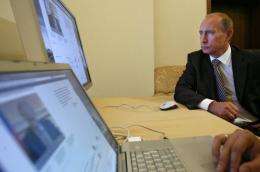Russian President Vladimir Putin looks at a computer in his office in Moscow in 2008. A new law seeking to protect minors from internet sites with harmful content comes into force in Russia on Monday amid criticism that it is a veiled move to increase censorship in the country.
A new law seeking to protect minors from internet sites with harmful content comes into force in Russia on Monday amid criticism that it is a veiled move to increase censorship in the country.
Under the law, which was approved by both houses of parliament in July, websites containing illegal "dangerous content" will be blacklisted on a federal register and forced to close.
Officially, the aim is to protect young people from sites that feature child pornography, promote drugs or offer tips for committing suicide but observers say the legislation is another step towards greater control over the population by President Vladimir Putin since his return to power in May.
In less than three months, parliament has adopted a series of laws labelled oppressive by the opposition.
They include the strict monitoring of political NGOs benefiting from foreign funding and heavy fines for anyone who organises unauthorised demonstrations.
(c) 2012 AFP





















